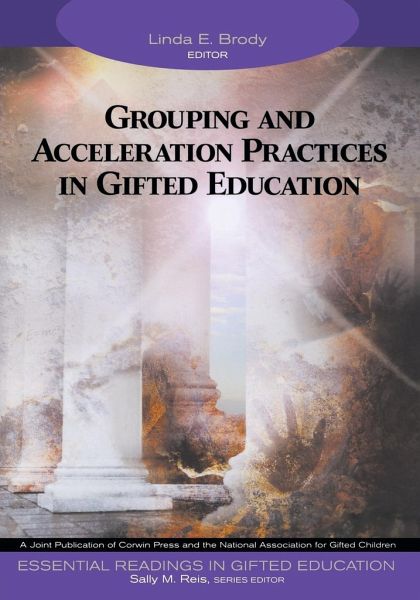
Grouping and Acceleration Practices in Gifted Education
Versandkostenfrei!
Versandfertig in 1-2 Wochen

PAYBACK Punkte
17 °P sammeln!




Various forms of grouping and acceleration are studied in this volume, along with recommendations for implementation.
Linda E. Brody directs the Study of Exceptional Talent and co-directs the Diagnostic and Counseling Center at the Johns Hopkins University Center for Talented Youth (CTY). She has over 25 years' experience counseling gifted students and their families and conducting research on this population. Having earned her doctorate in the Education of the Gifted from Johns Hopkins, she has taught graduate courses in gifted education there for many years. Her research interests focus on special populations, especially highly gifted students, gifted females, and gifted students with learning disabilities. She is also interested in identify-ing strategies and programs that facilitate talent development and supervises the publication of Imagine, a magazine for academically talented students. Linda has published numerous articles in professional journals and co-edited two books: Women and the Mathematical Mystique and Learning Disabled Gifted Students: Identification and Programming. She presents papers on a regular basis at national and international conferences and reviews articles for numerous journals in the field including Gifted Child Quarterly, Journal of Secondary Gifted Education, and Roeper Review. Sally M. Reis is a professor and the department head of the Educational Psychology Department at the University of Connecticut where she also serves as principal investigator of the National Research Center on the Gifted and Talented. She was a teacher for 15 years, 11 of which were spent working with gifted students on the elementary, junior high, and high school levels. She has authored more than 130 articles, 9 books, 40 book chapters, and numerous monographs and technical reports. Her research interests are related to special populations of gifted and tal-ented students, including: students with learning disabilities, gifted females and diverse groups of talented students. She is also interested in extensions of the Schoolwide Enrichment Model for both gifted and talented students and as a way to expand offerings and provide general enrichment to identify talents and potentials in students who have not been previously identified as gifted. She has traveled extensively conducting workshops and providing profes-sional development for school districts on gifted education, enrichment programs, and talent development programs. She is co-author of The Schoolwide Enrichment Model, The Secondary Triad Model, Dilemmas in Talent Development in the Middle Years, and a book published in 1998 about women's talent development titled Work Left Undone: Choices and Compromises of Talented Females. Sally serves on several editorial boards, including the Gifted Child Quarterly, and is a past president of the National Association for Gifted Children.
Produktdetails
- Verlag: Corwin
- Seitenzahl: 204
- Erscheinungstermin: 6. März 2004
- Englisch
- Abmessung: 254mm x 178mm x 12mm
- Gewicht: 395g
- ISBN-13: 9781412904292
- ISBN-10: 1412904293
- Artikelnr.: 22008788
Herstellerkennzeichnung
Libri GmbH
Europaallee 1
36244 Bad Hersfeld
gpsr@libri.de
Für dieses Produkt wurde noch keine Bewertung abgegeben. Wir würden uns sehr freuen, wenn du die erste Bewertung schreibst!
Eine Bewertung schreiben
Eine Bewertung schreiben
Andere Kunden interessierten sich für













